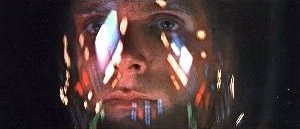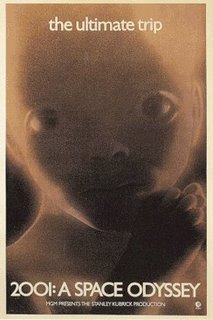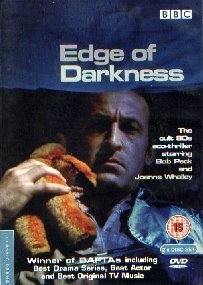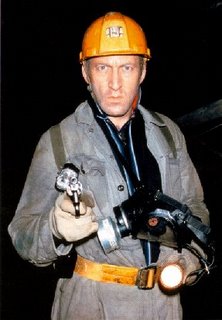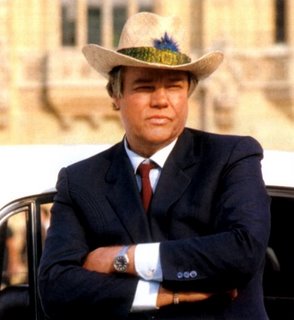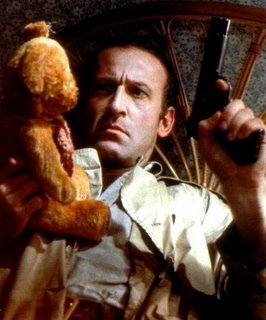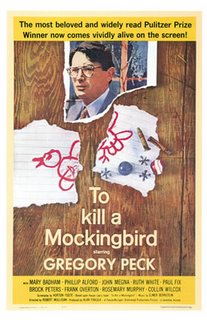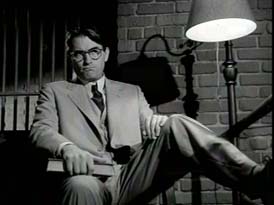 This is Orson Welles
This is Orson Welles" I discovered at the age of six that everything was a phony, worked with mirrors. Since then, I've always wanted to be a magician."
I had a lot to say about Orson Welles. I wrote a long dissertation about genius and discipline. About magic and illusion. But a lot of what I had to say was said in “Anytime Movies II”—I just said it differently.
Suffice it to say that every new Welles film opened up the world to a new, more wondrous interpretation. But…there are damned few Welles films. We will never see his unexpurgated version of “The Magnificent Ambersons.” Nor his modern dress version of “Don Quixote." ** Nor his suspense film "The Deep" (taken from the same source novel as Philip Noyce’s “Dead Calm”) which starred Laurence Harvey, Jeanne Moreau and Welles. There are tantalizing glimpses of his London documentary in the DVD of “F for Fake.” Then there’s the film he was working on when he died “The Other Side of the Wind”—Peter Bogdanovich is trying to get it finished for cable. But it won’t be the same. Every so often, bits and pieces of these projects appear to tantalize and disappoint. I guess the way I feel about Welles is like the diner who is promised a sumptuous meal but gets a maddeningly small portion.—there’s never enough. It’s frustrating.
Like this story.
I was going on vacation once when I was working at KIRO radio, and it was a much-needed vacation. A couple of days before it would begin one of the sales-sharks approached me. “Are you really going on vacation?” she asked. “What!” I said, suspecting a trap. “Are you going somewhere?” “Why do you ask?” “Well, I was wondering...if you wanted to record Orson Welles…” I would! Would I! Apparently, Welles was booked to appear with the Seattle Symphony to read Ogden Nash’s “Carnival of the Animals” to the Saint-Saëns piece. He was going to phone in a promotional commercial, and I’d have the chance to record him. Well, being that I idolized Welles, it didn’t matter if he was in the studio or I was recording him down the phone-line…it was Orson Welles! And, as a bonus, they’d give me a ticket to the concert. Yes!! Any nebulous plans I had for traveling someplace to relax went away—I was going to have a chance to record….Orson Welles! I made sure that I would be home all day and available at a moment’s notice to head down to the studio when the call came in that he was ready.
"The enemy of art is the absence of limitations."
That call came on Tuesday. Great! I’d get to record Orson (I was calling him “Orson”) AND have the bulk of my vacation. I went down to Broadcast House and met the Symphony folks there—extraordinarily nice people who I subsequently had a long relationship doing ads promoting the Symphony (through them, I got some free passes to performances like the one where I saw the perfect version of the “New World Symphony” my favorite piece of “classical” music. Welles was supposed to call at a designated time, and I showed up early—so excited was I to record my hero.
We had a speaker-phone arrangement in the studio, so there was no way to record the conversation when it was off. The way it’d work was we’d set up the call, put Orson on the speaker-phone and through that, then and only then, record him. Remember that. It’ll be important later.
The appointed time came and Orson hadn’t called. We checked with the switchboard and no, if Orson Welles had called, they’d know it—plus, he had the direct line to the studio. But he hadn’t called. An hour and a half later, the symphony rep called the number she had* and talked to someone at his house who said that Orson was “out” and he was supposed to be back two hours ago, and no, she didn’t know when he’d be back.
Okay, it wasn’t going to happen that day. We’d regroup, set up another time and get it done then. The Symphony ad wasn’t supposed to start airing until that Saturday, so we had time.
"The director is simply the audience. So the terrible burden of the director is to take the place of that yawning vacuum, to be the audience and to select from what happens during the day which movement shall be a disaster and which a gala night. His job is to preside over accidents."
Well, let me telescope this story and just say that we had a scheduled time almost every day that week, and I trudged down to the studio to record each time, and, each time, the same scenario played out, including the phone call to Orson’s house and the excuses—and the apologies. Still, I thought it was worth it if I could get him on tape and the Symphony folks, though wearying of it all, still were enthusiastic about the prospect.
As was I.
Friday was our “make or break” day. We had to record something—anything--to air over the weekend to promote the concert. All the usual suspects joined in the studio for the appointed time. True to form, the time passed with no phone call. He was supposed to call us. We’d been assured he’d be home. Nothing was going to interfere. An hour went by, a phone call was made, and we were assured he’d be home by 3pm. Okay, we said, we’ll call him at 3.
By this time, I was skeptical, so I started writing an alternative in case we couldn’t record Orson. I dashed it off and it was approved by the Symphony crew on the spot. 3pm rolled around. We all looked at each other—give him ten minutes, then call. As I remember, nobody spoke. We just sort of watched the clock. 3:05. This was going to be our last shot at recording Orson. 3:06. I checked the equipment to make sure everything was working, because after all, (3:07), it’d be really embarrassing to finally get him after al this time, and then (3:08) have something fall apart on us. Everything was fine. Tape was ready to roll. 3:09. We called. The Symphony rep dialed Orson’s number and we waited. She and I exchanged glances every time the phone buzzed down the line. I couldn’t hear anything, and I wouldn’t until the speaker-phone was engaged.
Then her eyes widened. A huge smile spread across her face. “Mr. Welles…” she started. But that’s all she said. The smile disappeared and turned into an expression of shock. I couldn’t hear any of it, but she blinked a couple of times and made the impression she was going to start to speak, but she never got the chance. After about 30 seconds, her mouth closed, never managing to say another word.
“What happened?”
“He yelled at me!”
“Wha…?!”
“He said to stop calling and bothering him”
“But…was it really him?”
“He called me a pest!”
“Yeah, that was Orson, all right,” I said. That was a particularly memorable word he used in the out-takes from a commercial session that had been floating around studios around the country (and which you can hear below)**
Damn! Orson in a tirade and because of that damned speaker-phone, I didn’t get to hear it, let alone record it.
Well, I set about to get my alternative recorded, and the symphony folks went back to headquarters to lick their wounds and wait for my phone-call to play the advertisement down the line.
Ultimately, I was told that Orson stewed about the “pests” and in the evening, figured out that it wasn’t a French interviewer who had been hounding him, but it was actually the Symphony, and he called and profusely apologized—it was a huge misunderstanding, please forgive him.
Yeah, yeah. But it was too late to record the commercial. I made the best I could of a nice weekend to try to turn it into a vacation, and returned to work Monday morning, having learned a lesson to never do anything like that again. At least, there was still the concert to look forward to.
A little while later. A phone call. “Orson’s not coming!” “Oh? What’s the matter?” “Doctor’s orders. He’s too ill to travel. We have to go with a substitute.” That would turn out to be Seattle actor John Gilbert, who did a superb job (if feeling somewhat out of his depth standing in for Orson Welles). And the program was great—witty and energetic and expertly played. A wonderful show.
But it wasn’t Orson Welles. But then again, it was all too much like Orson Welles. The potential for great things. The magic. And the frustration when things fall short. The disappontment. The lost chances. That is also Orson Welles. So much was out of his control. But quite a bit of it was. ***
"I think I made essentially a mistake in staying in movies, because I--but it's a mistake I can't regret, because it's like saying ''I shouldn't have stayed married to that woman, but I did because I love her.'' I would have been more successful if I'd left movies immediately, stayed in the theater, gone into politics, written, anything. I have--I have wasted the greater part of my life looking for money and trying to get along, trying to make my work from this terribly expensive paint-box, which is a movie. And I've spent too much energy on things that have nothing to do with making a movie. It's about two percent moviemaking and ninety-eight percent hustling. It's no way to spend a life." ORSON WELLES: [1982]
MARINA AT HOLLYWOOD’S MEMORIAL
Producers, deal-makers, lured by his death
to this hired hall, where were you all
when he needed you? Easy to call him your “Poet of Film”
now he is dead. While he lived, you locked arms
against him and called him a “failed genius.”
How sadly he told me, “They think I’m too old,
but what about George Bernard Shaw, Picasso
or Monte Verdi, seventy-five when he wrote his last opera?
For a man of his time, he was older than God,
but nobody told him, ‘You’re history, baby.’”
Now hear this about your “self-indulgent genius!”
How often he worked from dawn to dawn,
rewriting scripts, cigar stub clamped between his teeth,
the floor around him papered with ideas!
New ways to win you drove him through the days.
When I raged at the lack of justice, he observed,
“I don’t believe in justice but in luck. You never know
what kind you’ll get; that’s why you can’t give up.
I learned that from my father who died broke but happy.
If you lose today, you could still win big tomorrow.”
The films of your “failed genius” are hailed in every land
except his own, where his foreign work is damned
as “technically flawed” (in other words, not made in Hollywood).
Listen! Genius is not a wisdom tooth a man can lose
but the handprint one man makes on the wall of time!
Chris Feder Welles
"If you want a happy ending, that depends, of course, on where you stop your story."
Orson Welles....here, at his best.
"The movie director must always remain a slightly ambiguous figure, after all, because so much of what he signs his name to came from elsewhere, so many of his best things are merely accidents over which he presides. Or the good fortune he recieves. Or the grace."
"This is Orson Welles" p. 259 Orson Welles and Peter Bogdanovich; ©1998 Da Capo Press
Wellesnet - an Orson Welles blog
Orson Welles at IMDB
Orson Welles at Wikipedia
The Estate of Orson Welles - a tribute site
Orson Welles: a Man and his Genius - another tribute site
An interesting article about Welles
An article on "The War of the Worlds" broadcast
A rather definitive site on "The Mercury Theater"
Welles FBI Files
**The infamous Orson Welles "outtakes"
*I made a note of the number and wrote it down into my phone-ledger. I found that ledger the other day, and inside it was Orson Welles' home phone number.
** Well, now, here's a curious thing: a segment of Welles' "Don Quichotte" (backed by a bizarre version of The Doors' "The End") but you can see where Welles was going with taking the Don's visions into the modern era. This is a haunting piece of film, soundtrack or no.
***Post-script: Reading this, you'd think I had the opinion that Orson Welles was a failure. Far from it. If anything, Welles can only be said to have not lived up to his potential, which seemed limitless. As it stands, he is merely more human, more approachable. For all his foibles and falterings, his accomplishments, as they stand (and we are privy to so few of them!), are (to be annoyingly alliterative) formidable. We should all be such "failures."
Coming up: another "Anytime" Movie, and a personal hero who is...well, not to put too fine a point on it...ALIVE!
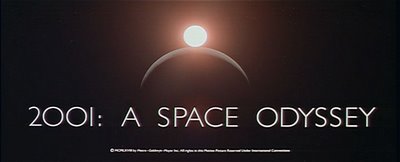
 My Dad took me and my friend Jerry Fortune to see "2001: A Space Odyssey" on my thirteenth birthday. I was a space kid. I lived and breathed the Apollo program. I knew every Astronaut’s name and every mission. What went right and what went wrong. The names of landing sites and prominent craters nearby.
My Dad took me and my friend Jerry Fortune to see "2001: A Space Odyssey" on my thirteenth birthday. I was a space kid. I lived and breathed the Apollo program. I knew every Astronaut’s name and every mission. What went right and what went wrong. The names of landing sites and prominent craters nearby.